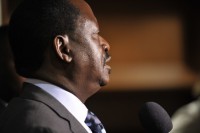
This piece, written by Danny Hirschel-Burns, from Swarthmore College STAND, originally appeared on his blog The Widening Lens.
The peace versus justice debate is unavoidable when it comes to the International Criminal Court (ICC). The conversation goes something like: Team Peace argues that the immediate cessation of violent conflict has to take precedence over everything else, while Team Justice argues that ending impunity for human rights violations is crucial for deterrence against human rights violations in the future. While this summary totally simplifies a complicated and multipolar conversation, these two camps shape the basic nature of the debate. Though both have solid points, a messy, subjective truth lies somewhere in the middle and the effects of justice are heavily dependent on the specific situation.
While the division between peace and justice is not rock-solid, there are indeed real problems with pursuing justice over peace (a theme I’ve written about before). A perfect example is Sudan. The ICC’s arrest warrant against President Omar al-Bashir increases his need to stay in a position of power (though he says he will step down in 2015 this is probably more of a result of internal NCP politics and he certainly has no intention of handing himself over to the ICC), and has decreased his ability to participate in negotiations. This fact decreases the possible avenues of engagement for the international community (to varying degrees depending on the actor) to bargain with Bashir, ultimately hampering the opportunities for an international tempering influence, which his is especially unfortunate given Bashir’s current position of weakness.
Another example of unintended ICC consequences is in Kenya, where ICC-charged duo Uhuru Kenyatta and William Ruto were essentially brought together as a political unitbecause of their respective warrants that date back to the election violence in 2007-2008. Ruto and Kenyatta were able to use their confrontation with the ICC as a symbol of their resistance against foreign influence, consequently gaining them votes. Their ticket eventually won the Kenyan elections (though there seems to also be evidence that the ICC helped convince Kenyatta and Ruto to call for calm before and after the election), and Kenyatta is now the second head of state to have been summoned by the ICC. Unlike Bashir however, Kenyatta has cooperated with The Hague thus far.
 So while there are real downsides to justice over peace, there are also plenty of benefits from a justice-centered approach. As Erik Voeten points out in his Monkey Cage post, the ICC is very effective in deterring human rights abuses in countries where “mid-level” human rights abuses take place. Also, the ICC is quite good at influencing mid-level individuals. While Bashir, as Sudan’s leader, is out of the ICC’s reach, mid-level individuals in security forces and rebel groups worldwide are much more expendable, and they know that if a higher-up decides they’re a liability because of the atrocities they’ve committed, they’ll be on the next plane to The Hague. The threat of ICC prosecution, for example, had a positive effect in Colombia, and the institution is quite effective at deterring torture.
So while there are real downsides to justice over peace, there are also plenty of benefits from a justice-centered approach. As Erik Voeten points out in his Monkey Cage post, the ICC is very effective in deterring human rights abuses in countries where “mid-level” human rights abuses take place. Also, the ICC is quite good at influencing mid-level individuals. While Bashir, as Sudan’s leader, is out of the ICC’s reach, mid-level individuals in security forces and rebel groups worldwide are much more expendable, and they know that if a higher-up decides they’re a liability because of the atrocities they’ve committed, they’ll be on the next plane to The Hague. The threat of ICC prosecution, for example, had a positive effect in Colombia, and the institution is quite effective at deterring torture.
Unfortunately though, the existence of the ICC does little to deter the most egregious human rights violations. Individuals like Assad, Bashir, and Gaddafi have never been cowed by threats of eventual justice. Keeping power outweighs any potential risks. Conversely though, the existence of the ICC does not encourage human rights violations as James Fearson argued. While it is supposed to, the ICC does not really close off all escape routes (they’ve never been in short supply anyway) for human rights violators, but these escape routes, in the end, have little effect on the level of human rights violations committed. It is not as if Assad is being encouraged to kill as many people as possible before escaping to the ICC; leaders like Assad and Gaddafi never had any intention of pulling the escape cord when it looked like they have a credible chance of losing. While the ICC can do little to prevent leaders bent on maintaining power through any means necessary from doing so, it can at least provide a just conclusion to some of these cases (Bosco Ntaganda is a good example), an outcome which shouldn’t be trivialized.
Justice and peace and not mutual exclusive phenomena, and while one can sometimes endanger the other, the specific context of each situation must always be taken into account before making a policy recommendation. Ultimately, this is a debate that the ICC will have to enter to an increasing degree in coming years. While it has made some progress, it must to do more to address the problems that come with an inflexible, justice-centered approach. Luckily, it does have the tools to do that. Article 53 of the Rome Statute, the founding document of the ICC, allows for the Chief Prosecutor to offer amnesty to a perpetrator in the interests of the victims. This precedent should not be applied in every situation, but does potentially allow the ICC to take a more critical approach to its activities. The ICC has certainly been a milestone achievement in the fight to end international impunity for large-scale human rights violations, but it is not without its problems.
